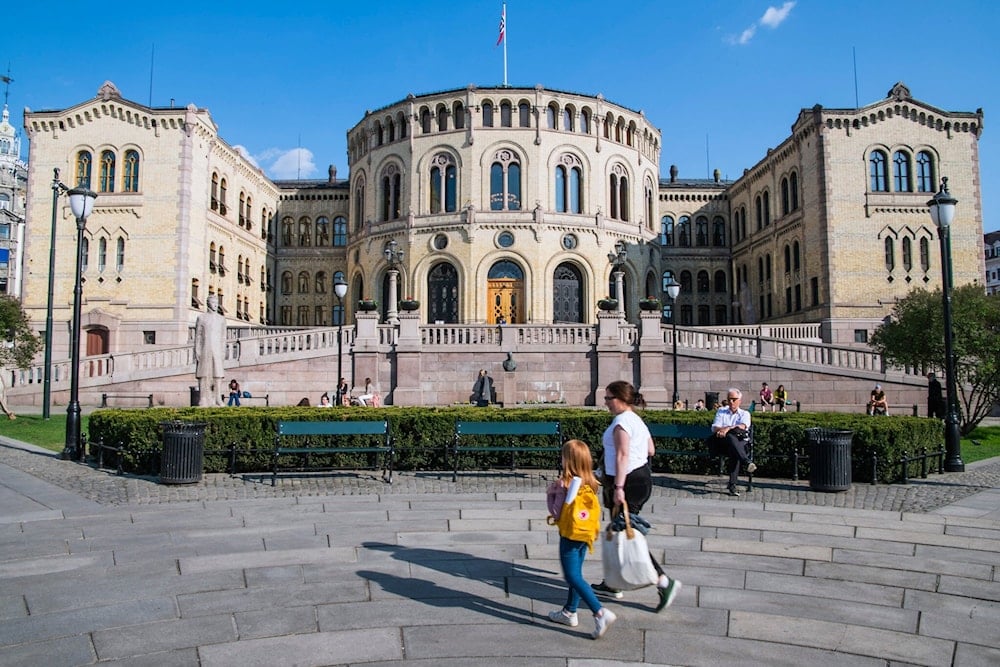Norway votes to pause ethical divestments by its $2.1T wealth fund
Norway’s parliament halts ethical divestments from its $2.1 trillion fund as it reviews guidelines amid global scrutiny and market risk concerns.
-

The Norwegian Parliament, on April 29, 2019, in Oslo (AFP)
Norway’s parliament approved a temporary pause on ethical divestments by the country’s $2.1 trillion sovereign wealth fund, the world’s largest, as it works on updating the fund’s ethical guidelines.
The proposal, put forward by the minority Labour government earlier on Tuesday, came amid heightened international attention on the fund’s ethical divestment decisions.
In September, the US State Department expressed that it was "very troubled" by the fund’s decision to divest from construction equipment company Caterpillar, citing concerns over the use of the company’s products by Israeli authorities in Gaza and the occupied West Bank.
Finance Minister Jens Stoltenberg told parliament earlier on Tuesday that "the world has changed since the ethical guidelines were first adopted," adding, "The rules need to be reviewed."
Which guidelines are set to be reviewed?
The fund’s ethical guidelines, established by parliament and first introduced in 2004, specify, among other provisions, that the fund is prohibited from investing in companies involved in serious violations of individuals’ rights in war or conflict situations.
Alleged breaches are investigated by an independent ethics body, which also recommends companies for divestment, while the final decision to withdraw investments rests with the central bank’s board. Stoltenberg told parliament that the recommendations for divestment will now be suspended for approximately a year while the ethical guidelines undergo review.
The Conservatives, while backing the proposal, raised concerns about why the decision was being expedited, noting that such matters typically take months or even years to pass through parliament.
Stoltenberg said the pause is needed to protect the fund, which now covers 25% of public spending, as much of its value depends on a few major companies. He noted that the seven most valuable, Nvidia, Microsoft, Apple, Amazon, Alphabet, Meta, and Broadcom, account for 16% of the fund’s stock holdings.
He emphasized that under current ethical guidelines, the fund could be barred from investing in these top global firms, risking its status as a broad, global index fund.
Proposal under fire
Three parties that Labour relies on to pass its budgets condemned the proposal.
During the Nordic country's most recent election campaign, in August and September, the fund's investments in "Israel" took centre stage, with some parties campaigning on the issue.
One said it would only support a future Labour government if it divested from all companies involved in what it called "Israel's illegal warfare in Gaza."
On Tuesday, that party, the Socialist Left, said the government was acting out of fear of the United States. "(This) is, without a doubt, really about the fear of Trump's reactions," Socialist Left lawmaker Ingrid Fiskaa told parliament.
Separately, the fund's management said it would vote against ratifying Tesla (TSLA.O) CEO Elon Musk's proposed compensation package, containing shares worth up to $1 trillion, which critics have called excessive.
Driving the news
In early June 2025, Norwegian lawmakers debated a proposal to fully divest the fund from companies operating in Israeli‑occupied Palestinian territories. Although pressure was mounting, the fund maintained its policy of selective exclusions rather than a blanket withdrawal.
By mid‑August 2025, the fund announced it had divested from six additional Israeli companies connected to Gaza and the West Bank, following an ethics review. This followed earlier steps in June when the number of Israeli firms held by the fund dropped from 61 to 38, with more than US$400 million in holdings sold.
Simultaneously, the fund terminated all external asset‑manager contracts for its Israeli investments, bringing them in‑house to tighten oversight.

 4 Min Read
4 Min Read








